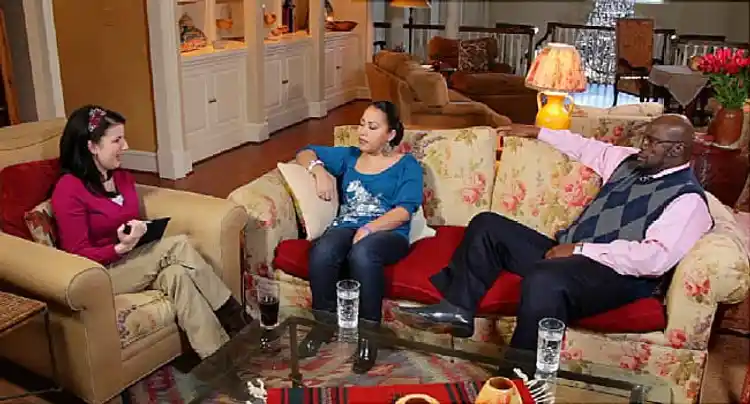Coping with Depression

Hide Video Transcript
Video Transcript
CHRISTINE MISERANDINO
Hey, come on in. Nice to meet you. [INAUDIBLE]. Let's move over here. As much as we want to empower patients and as much as we want to be positive, we also need to be real. And depression can be a part of your life-- lupus life. Did you will feel that way? ERIC CALHOUN
Initially. When lupus kind of reared, if I may, his ugly head in my life, I was at the prime of 22, in the military, expecting to be a career soldier. And all of a sudden, without any warning, lupus just kind of exploded. And for a whole year, I was in the hospital. But while I was in the hospital, I started losing my hair. Lesions start erupting everywhere. And so I go from this-- excuse the expression-- this handsome young man, and all of a sudden, all of these facial changes start taking place. It was extremely depressing. AIDS was just coming on the scene, and my face is changing. My hair is falling out, so people would equate the changes that I was experiencing with AIDS. So now I'm getting this stare like, oh, he has AIDS, right? CHRISTINE MISERANDINO: Because you know, no one knows about lupus.
ERIC CALHOUN
Right. But it was lupus. So I started using drugs to help deal with it, started drinking, doing everything that I could to keep the attention off of me. GABY DOMINGUEZ
Like you dealt with it with drugs-- ERIC CALHOUN
Mm-hm, alcohol. GABY DOMINGUEZ
And alcohol. And me, I just stayed at home, just stayed away from everybody. CHRISTINE MISERANDINO
Isolated. GABY DOMINGUEZ
Yes. Just didn't want to deal with the people, the staring, because being on high doses of steroids changes your face. You know, they call it the moon face. So when you're used to always getting compliments-- oh, you're beautiful-- and then for people to stare, but you know they're not staring because you look nice today. It's more of, why is her face so puffy? Or why does she look that-- CHRISTINE MISERANDINO
A lot of people think, well, why did you gain all this weight? ERIC CALHOUN
Yeah. CHRISTINE MISERANDINO
And it's not weight. It's the medication or-- ERIC CALHOUN
It's the medication. Exactly. CHRISTINE MISERANDINO
Or you're saying lesions and things. GABY DOMINGUEZ: Physical changes.
CHRISTINE MISERANDINO
It's the lupus. ERIC CALHOUN
It's the lupus. CHRISTINE MISERANDINO
It's not like you are doing this. ERIC CALHOUN
No, no. CHRISTINE MISERANDINO
And you feel out of control. ERIC CALHOUN
No, I was power-- I felt powerless. I felt absolutely powerlessness, because my concern at that time-- well, who will want me? Who will accept me? Will there be a woman that will accept these scars? That's what I was dealing with. GABY DOMINGUEZ
It broke me. I mean, I always would think, you know, why would people even think for a moment to take their lives? I mean I really thought of different ways of how I could make it easier just to be pain-free. When you're in constant pain every day, and medication's not helping, and you're like, am I going to make it tomorrow? Will I be alive? Will I be able to see my daughter grow up? I think with the Spanish communities, the 15s, the sweet 15s. And I'm like, will I live to see my daughter have her sweet 15? CHRISTINE MISERANDINO
It's funny, because it's not just when you're newly diagnosed, because I really thought I had it-- I really thought I had it under control. And then I had my beautiful baby, and I actually had very bad post-partum. And part of it was because I could not even hold my own baby, because my arms are so weak. And I couldn't walk, because the way my body reacted to the c-section. And I remember thinking how horrible of a person I was to bring a baby into the world, and I am a sick mom. And I couldn't bathe her myself. I was too afraid. She was slippery, and I remember in those first few months feeling like I was the worst-- I was the worst mother in the world. And I was so depressed. And I thought that lupus won. You know, lupus won. And then I really-- I had to seek out therapy, which is important. ERIC CALHOUN
Yes, it is. CHRISTINE MISERANDINO: I had to go to a support group, and I remember going to a support group going, I'm the worst mother in the world. And three other ladies went, no, no, no. I'm the worst mother in the world. And I really-- I had to talk to someone about it, because it was that bad that you do go dark places.
ERIC CALHOUN
You do. You do. CHRISTINE MISERANDINO
And you do you think of harming yourself, or I really thought that maybe she was better off without me. ERIC CALHOUN
Right. Well-- CHRISTINE MISERANDINO
Maybe she's better off with no mother than a mother with lupus. GABY DOMINGUEZ
I don't think I ever got to that point thinking maybe they're better off without me. Mine was more like, it's so unfair. CHRISTINE MISERANDINO
Right. ERIC CALHOUN
It's so unfair that I can't enjoy my kids. I can't even take them out to the park. CHRISTINE MISERANDINO: It doesn't just affect you.
ERIC CALHOUN
No, it affects the family. GABY DOMINGUEZ
It's different. CHRISTINE MISERANDINO
You can be depressed, and your friends and family are feeling it. It's around you. ERIC CALHOUN
Yes. CHRISTINE MISERANDINO
No one knows what you're thinking-- ERIC CALHOUN
No one. CHRISTINE MISERANDINO: --until you say it. And really, once I started communicating and finding that support, the minute you express that darkness or that hopelessness or whatever it is, and you share it, now it's out there.
ERIC CALHOUN
But you have to share it with someone who understands. GABY DOMINGUEZ
Who understands. ERIC CALHOUN
Yes, because as a male-- CHRISTINE MISERANDINO
Very true. ERIC CALHOUN
--as a male, I'm losing a lot of my power, because I can't control this. And are a lot of things that I want to do as a man of my house, I'm not able to do those things. And that really has a psychological impact. CHRISTINE MISERANDINO
I'm sure. GABY DOMINGUEZ
It does. ERIC CALHOUN
Yes. For sure. GABY DOMINGUEZ
It does. ERIC CALHOUN
And you have to have understanding people. If you said this to another man, oh, there's nothing wrong with you. You don't understand, though. It has nothing to do with how I look on the outside. This is all internal. CHRISTINE MISERANDINO
It's so important, I think, for lupus patients to reach out to other lupus patients. ERIC CALHOUN
Yes. CHRISTINE MISERANDINO
And we can help each other. ERIC CALHOUN
Yes, accept it. Don't deny it, because once you accept it, we're able to move beyond that now. We can live with it. GABY DOMINGUEZ
Don't go in your own little world, and think it's going to get better, just you by yourself, and it's going to be OK. No. Just talk about it. It's OK. CHRISTINE MISERANDINO: It's fair to say, it's OK to be angry. It's OK to be sad. But I could get through this. We can get through this together.
ERIC CALHOUN
That's realistic. CHRISTINE MISERANDINO
That's real. ERIC CALHOUN
That's real. Yeah, that's real. CHRISTINE MISERANDINO
Real life is real lupus makes me angry and sad sometimes. But the reality is it isn't going away, so I need to learn to deal with it. And I need to reach out to friends. ERIC CALHOUN
That's it. CHRISTINE MISERANDINO
Thank you for being here. ERIC CALHOUN
Plug into support groups. CHRISTINE MISERANDINO
And I need to empower myself, find friends, and know that I'll get through it. ERIC CALHOUN
Yes. GABY DOMINGUEZ
Yes. 